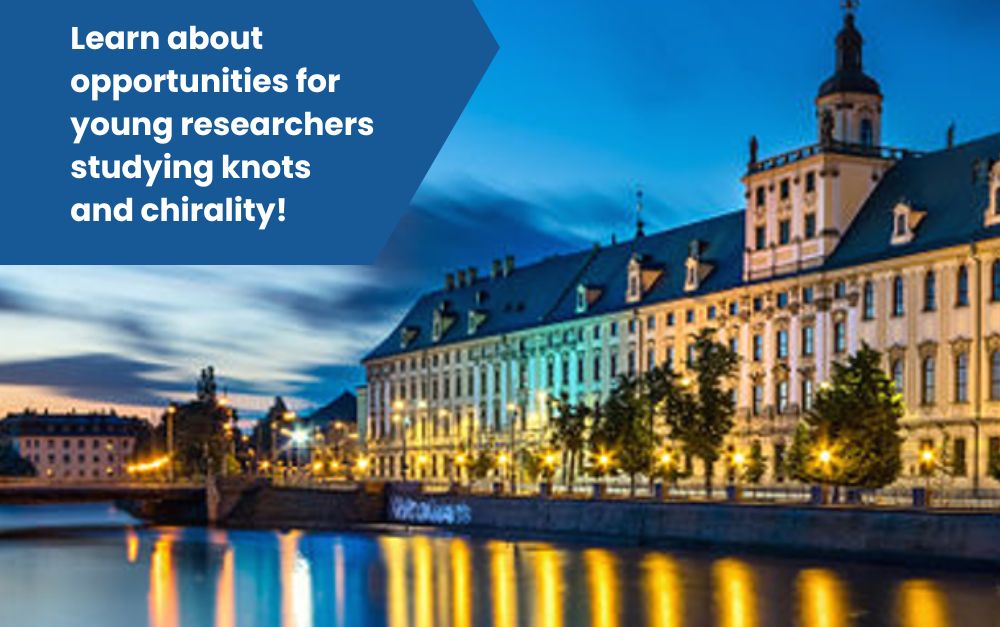WPI-SKCM² Symposium for Young Scientists in Europe

Date
Saturday, October 14, 2023
9:30 – 16:00 CET / 16:30 – 23:00 JST (subject to change)
The Main Scope
This symposium will bring together young researchers in Europe to experience a new research paradigm of interlinking knots and chirality. The International Institute for Sustainability with Knotted Chiral Meta Matter (SKCM2) is the unique place for conducting highly fundamental and interdisciplinary research and offering young researchers excellent opportunities to extend their intellectual horizons. The symposium will consist of an overview session introducing the missions and opportunities at SKCM2 and a Q&A panel discussion, followed by a poster session and a light lunch.
Form of the symposium
Hybrid
Venue
Uniwersytet Wrocławski
pl. Uniwersytecki 1
50-137 Wrocław, Poland
Support
No registration fee
Limited budget for students available (travel and accommodation)
Local Organizers
dr hab. Chihiro Sasaki, prof. UWr & HU (chair)
dr hab. Katarzyna Matczyszyn, prof. PWr
Program:
9:30 – 9:35 Opening address
9:35 – 10:05 Ivan I. Smalyukh, Univ of Colorado & WPI-SKCM2: Overview of SKCM2 (missions, research program) (20+10) [remote]
10:05 – 10:20 Katsuya Inoue, WPI-SKCM2: Overview of the academic opportunities at SKCM2 (internships, research exchanges, post-doctoral fellowships) (15) [remote]
10:20 – 10:50 Pawel Pieranski, Université Paris-Saclay: Topological metadefects (25+5)
10:50 – 11:15 Silvia Vignolini, Univ of Cambridge & Max Planck Institute & WPI-SKCM2: Chiral bio- materials and self-assembly (20+5) [remote]
11:15 – 11:45 Group photo & break
11:45 – 12:10 Andrzej Wereszczynski, Jagiellonian Univ & WPI-SKCM2: Dynamics of Topological Solitons in High Energy Physics (20+5)
12:10 – 12:30 Hikaru Yabuta, WPI-SKCM2: Hayabusa 2 asteroid sample return mission: What the Ryugu rock tells us (15+5) [remote]
12:30 – 12:50 Andrey Leonov, WPI-SKCM2: Chiral solitons: from skyrmions to hopfions (15+5) [remote]
12:50 – 13:10 Shin-ichi Tate, WPI-SKCM2: Protein condensates and their relevance to neurodegenerative diseases as knotty social problems (15+5)
13:10 – 14:10 Lunch (light meals and beverages to be served)
14:10 – 14:30 Kenta Shigaki, WPI-SKCM2: Dynamic Chirality in High Energy Nuclear Physics: Origin of Our Own Mass (15+5)
14:30 – 15:20 Flash talks (3 min/presenter)
Emilia Szymańska, UWr: Spontaneous Symmetry Breaking; Goldstone’s Theorem Dominika Benkowska-Biernacka, PWr: The effect of pH on the formation and morphology of lyotropic myelin figures Valeriya Mykhaylova, UWr: Charm production in various scenarios of the QGP evolution Michał Bobula, UWr: Rainbow Oppenheimer-Snyder collapse and the entanglement entropy production Marcin Postolak, UWr: Is it possible to separate baryonic and dark matter within the LCDM formalism? Maciej Kowalczyk, UWr: Regularizations and quantum dynamics in loop quantum cosmology Michal Szymanski, UWr: Impact of dynamical screening of four-quark interaction on the chiral phase transition Mikołaj Głowiński, Politechnika Gdańska: Electrospun materials decorated with nanodiamonds (ES-ND): synthesis, properties and possible application in electroanalysis Sabrina Grenda, Univ of Lyon 1: Functionnalized borazine by nitroxide radicals : Synthesis and Magneto-structural properties Morgan Kuchta, UWr: The Mass And Possible Quantum Numbers of X(6900) Shigehiro Yasui, WPI-SKCM2: QCD Kondo effect Rafał Kukawka, Fundacja Uniwersytetu im A. Mickiewicza w Poznaniu: Application of BTH derivatives as plant biostimulant Masahiro Oida, WPI-SKCM2: Search for chiral symmetry restoration via di-muon measurement at high energy nucleus-nucleus collision experiment ALICE at CERN-LHC Nina Tarnowicz-Staniak, PWr: AuPd Nanorods: Possibilities Stemming from Linear and Nonlinear Optical Properties Jastin Popławski, PWr: The Use Of Light Scattering in Controlling Light Amplification
15:20 – 15:30 Closing remarks
How to get to the venue
by plane:
The Copernicus Airport is the major airport in Wrocław. There are several flights per day from Warszaw, Poland, as well as Frankfurt and Munich, Germany. The airport is well connected to the city center. To reach either the city centre or the venue from the airport, you can take:
– Taxi: 60 PLN ~ 15 EUR – Public transportation: Tickets may be purchased in ticket machines (biletomat) located at bus stops or onboard tram/bus using debit or credit card. Single ride ticket is 3 PLN (~ 0.75 EUR) valid for 30 minutes. Please follow Google Maps public transportation instructions.
by train:
The central train station, Wrocław dworzec główny, is located in the city center. The timetable can be found at http://rozklad-pkp.pl/en. The train station is well connected with all parts of the city. Bus and tram stops are located both north and south of the train station.
by car: Wrocław is located at the highway A4, which connects the city to Katowice/Cracow/Opole to the east and Legnica/Zgorzelec/Dresden(Germany) to the west. It is also connected to the national roads: 5 Poznań, 8 Kłodzko/Prague/Warsaw, 35 Jelenia Góra, 94 Oława/Zielona Góra.
In Wroclaw
To travel within Wrocław you can use tram or bus. Tickets may be purchased in ticket machine (biletomat), located at bus stops, or onboard tram/bus, using debit or credit card.
Venue
Oratorium Marianum Uniwersytet Wrocławski pl. Uniwersytecki 1
You can enter the main university building from the entrance, saying “Muzeum”, indicated with red arrow on the map. The venue is found on your right hand side (on the ground floor).


